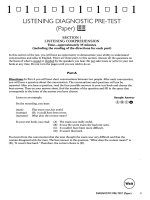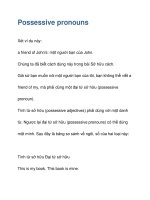Possessive pronouns and adjectives 3
Bạn đang xem bản rút gọn của tài liệu. Xem và tải ngay bản đầy đủ của tài liệu tại đây (8.24 KB, 1 trang )
Possessive pronouns and adjectives
The possessive forms mine, yours, his, hers, ours and theirs are pronouns, used without following nouns.
That coat is mine. Is this yours?
My hair is black. His is grey.
He is a friend of ours.
I have a book of yours with me.
We do not use articles with possessive pronouns.
‘Can I borrow your pen?’ ‘I can’t find mine.’ (NOT I can’t find the mine.)
Its and one’s cannot be used as pronouns, but one’s own can be used as a pronoun.
Other people’s lives always seem more interesting than one’s own. (NOT Other people’s lives always seem
more interesting than one’s.)
The possessive word whose can be used both as an adjective and as a pronoun.
Whose bag is this? (whose as an adjective modifying the noun bag)
Whose is this bag? (whose as a pronoun)
A plural possessive adjective is usually followed by a plural noun.
The teacher told the boys to open their books. (NOT The teacher told the boys to open their book.)
The words my, your, his, her, their and our are possessive adjectives. They are used with nouns.
This is my bag. (Here my is used as an adjective modifying the noun bag.)
This bag is mine. (Here mine is used as a pronoun.)
Stay on top of your writing! Download our grammar guide from www.englishgrammar.org to stay up-to-date.
Powered by TCPDF (www.tcpdf.org)









